To bridge the gap between intention and reality, many wineries are now creating apprenticeship programs or reaching out to organizations designed to boost inclusion.
By Kathleen Willcox
At this point, the fact that the wine industry needs a fresh perspective is old news.
The only growth segment in the industry is the 60+ segment and, for the second year in a row, overall consumption declined — the first time that has happened in 40 years, according to the 2023 Silicon Valley Bank State of the Wine Industry Report. The 59 and under set is simply no longer connecting with the world of wine.
For an increasing number of people in the industry, the disconnect can be blamed on the lack of young, diverse voices within the industry itself. The numbers are stark: less than 1 percent of wineries in the United States are owned by Black people and just 14 percent of wineries have a woman as their head winemaker.
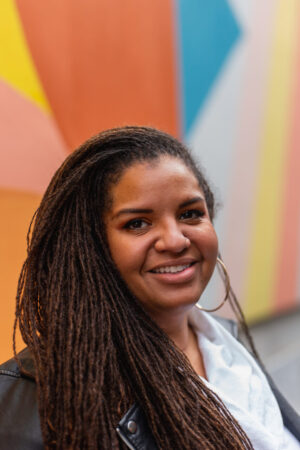
“At a certain point, I realized that I was often the only person in the room who looked like me,” says Tiquette Bramlett, founder of Our Legacy Harvested, of the wine industry’s lack of diversity. “People of color would get so excited to see me at events when I was working as a brand ambassador, because they weren’t used to seeing that.”
But many well-meaning wine leaders who want to grow a more inclusive workforce haven’t found it easy to find and attract a diverse pool of candidates. To bridge the gap between intention and reality, many wineries are now creating innovative internal apprenticeship programs or reaching out to organizations designed to boost inclusion. Read on for insight into these programs, and how they may just help wineries connect with a new audience.
Seeking Fresh Perspectives
“We created A Really Goode Job program to find people outside of our industry, or just on the periphery, who could bring their own unique perspective to Murphy-Goode,” says winemaker Dave Ready Jr. of the nationwide search he and his team at the Sonoma County, Calif., winery launched in 2021. “Our goal was to find lifelong employees who would truly become part of our culture and help us broaden our perspective in the process.”
But this was no regular job search or application process — or job, for that matter. The person selected for the Really Goode Job would be given a $10,000 per month salary (for one year); a free residence in a small home in Healdsburg, Calif.; a one-year supply of Murphy-Goode wine and the opportunity to “try out” every department at the winery, including rotations in the vineyard, cellar, marketing and sales department. (After the first year, salaries will be normalized in line with what’s typical in the department and position they seek, and housing will become the responsibility of the employee.)
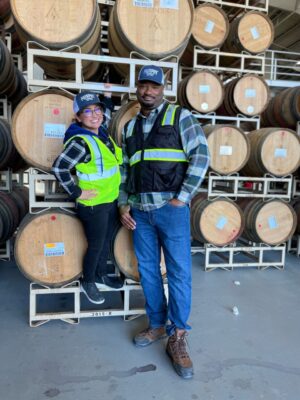
“We were offering that kind of package because we wanted to attract serious talent, and we know that for many, changing jobs or moving across the country creates an enormous financial burden,” Ready explains.
To apply, candidates created 90-second videos explaining why they were perfect for the job. Out of more than 7,000 applications, the pool was reduced to a dozen finalists who were flown out for a multiday in-person interview.
“We had huge dinners with key members of our team, maybe 40 of us in all,” Ready recalls. “We wanted to see if they liked us, and if we liked them.”
In the end, the winery couldn’t pick just one, so it brought on two apprentices: Lauren Neil of Reno, Nev., and Roosevelt Johnson of Tucson, Ariz.
“At first, I thought it was too good to be true,” Neil, a 33-year-old who worked in sales for a senior living property, says of landing the job. “I have been increasingly interested in wine, and having this opportunity to turn it into a career has been life-changing. I have enjoyed every department since starting in September. I really loved harvest and the opportunity to learn everything there is that goes into the making and selling of a bottle of wine. I absolutely see myself staying here, probably focusing on marketing.”
Ready, for his part, says that “getting a new perspective has been invaluable. We get so bogged down in tradition. What pairs with white wine? Oysters. But as one of our applicants said, ‘Not everyone eats oysters. Why not try pairing it with gumbo?’ That really planted a seed for us, and we are revisiting the way we discuss food and wine pairings.”
Building Community and Inclusion
“I founded Our Legacy Harvested in 2020, but I’d been thinking about it for several years,” says Bramlett of her Willamette Valley nonprofit. “Before launching, I reached out to people of color in the industry, interested in the industry and a few who left the industry to see what was missing, and what they’d need to feel supported. Then, I started reaching out to wineries to find out what they were looking for in terms of staff. Then the pandemic happened, and all of the Black Lives Matter protests.”
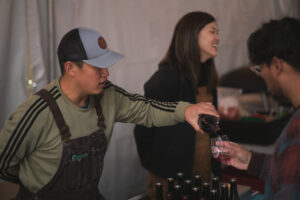
Sensing that the moment to launch Our Legacy Harvested had arrived, Bramlett created a program designed to link up ambitious BIPOC candidates with wineries eager to find them. In 2023, Our Legacy Harvested selected four interns from across the country to come out to Oregon and work for four months at a winery, with the goal of trying out every aspect of the industry, from vineyard to sales.
The program covers transportation to Oregon, room and board while they’re there and access to a vehicle. Participating wineries — including Adelsheim and WillaKenzie — pay the interns.
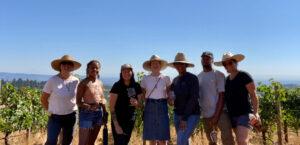
“It’s about creating a sense of community,” Bramlett says. “Sometimes the winery will include housing for interns, but we like having a separate house for our team, so they have the opportunity to hang out and connect with each other after a long day at work. We also check in with them, get together and bring them on educational field trips. When the internship is over, we can’t guarantee a job, but we can guarantee a community and opportunity.”
Elevating Women in the Industry
Amanda Wittstrom-Higgins recognizes the issue of inclusion in the wine industry, and has also diagnosed another problem: a culture whose understanding of, and support for, working mothers is often outdated. This lack of understanding, says Wittstrom-Higgins, can mean missing out on smart and dependable workers who are also an ideal voice for many consumers in the market.
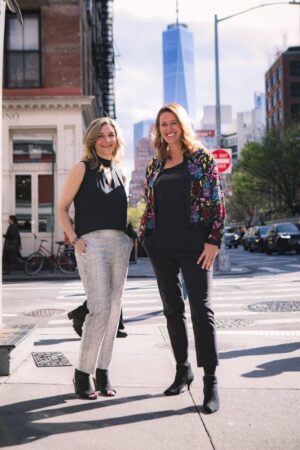
“Recruiting great candidates is one issue, and retaining them is another,” Wittstrom-Higgins points out. “I began to notice that just as women were beginning to hit their stride in their career, they were at an age where they might decide to have children. If and when they did, there was often no room for flexibility. The industry expects people to work on the weekends and at night, and travel is often expected.”
By essentially shutting out an entire cohort of smart and dependable workers, Wittstrom-Higgins believes the industry is doing a disservice — not just to these women, but to itself.
“Women make most of the wine-buying decisions in the United States, and by not having female voices at the top of the industry, we’re losing their valuable perspective on what they want and why,” she says.
Wittstrom-Higgins, who worked for 15 years at Ancient Peaks, her family’s winery in Paso Robles, Calif., wanted to staunch the brain drain she was seeing. In 2018, she founded Dream Big Darling, to empower the next generation of women leaders in the wine and spirits industry. In 2021, she teamed up with Rona Millinger of The Millinger Group on a scholarship program designed to coach and mentor emerging women leaders in the business.
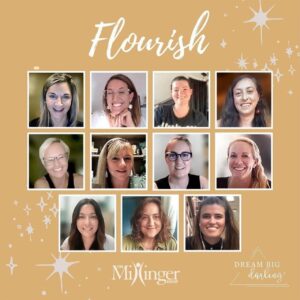 Dubbed FLOurish, it is named in honor of Millinger’s late mentor, Florence Pramberger, a former human resources juggernaut at Seagram’s Beam and Mast-Jagermeister. Jagermeister has agreed to fund the program for six years.
Dubbed FLOurish, it is named in honor of Millinger’s late mentor, Florence Pramberger, a former human resources juggernaut at Seagram’s Beam and Mast-Jagermeister. Jagermeister has agreed to fund the program for six years.
Up-and-coming women in the business are encouraged to apply, and more than a dozen successful candidates are selected to go through a seven-month mentorship program, led by Millinger, that is designed to suit their goals.
“Personalized coaching and development programs are such an effective way to develop leaders,” Wittstrom-Higgins says. “This up-and-coming generation, more than ever, is seeking work-life balance. If we want to grow, cultivate and retain top talent, we need to acknowledge that.”
Most brands want to do the socially responsible thing — and everyone wants to see their bottom line improve. But whether wineries want to do the right thing or just boost sales, reaching a wider audience through a more representative workforce should be on their to-do list.
_____________________________________________________________________
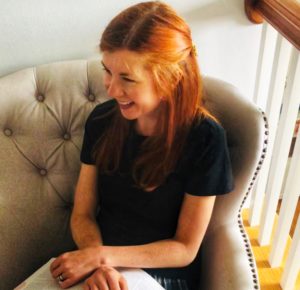
Kathleen Willcox
Kathleen Willcox writes about wine, food and culture from her home in Saratoga Springs, N.Y. She is keenly interested in sustainability issues, and the business of making ethical drinks and food. Her work appears regularly in Wine Searcher, Wine Enthusiast, Liquor.com and many other publications. Kathleen also co-authored a book called Hudson Valley Wine: A History of Taste & Terroir, which was published in 2017. Follow her wine explorations on Instagram at @kathleenwillcox



















This is refreshing to read! As a wine and spirits broker, I’m often the only Black Woman working alongside distributors to present and sell brands to a market. Happy to know there is a focus on diversifying the workforce in my industry.